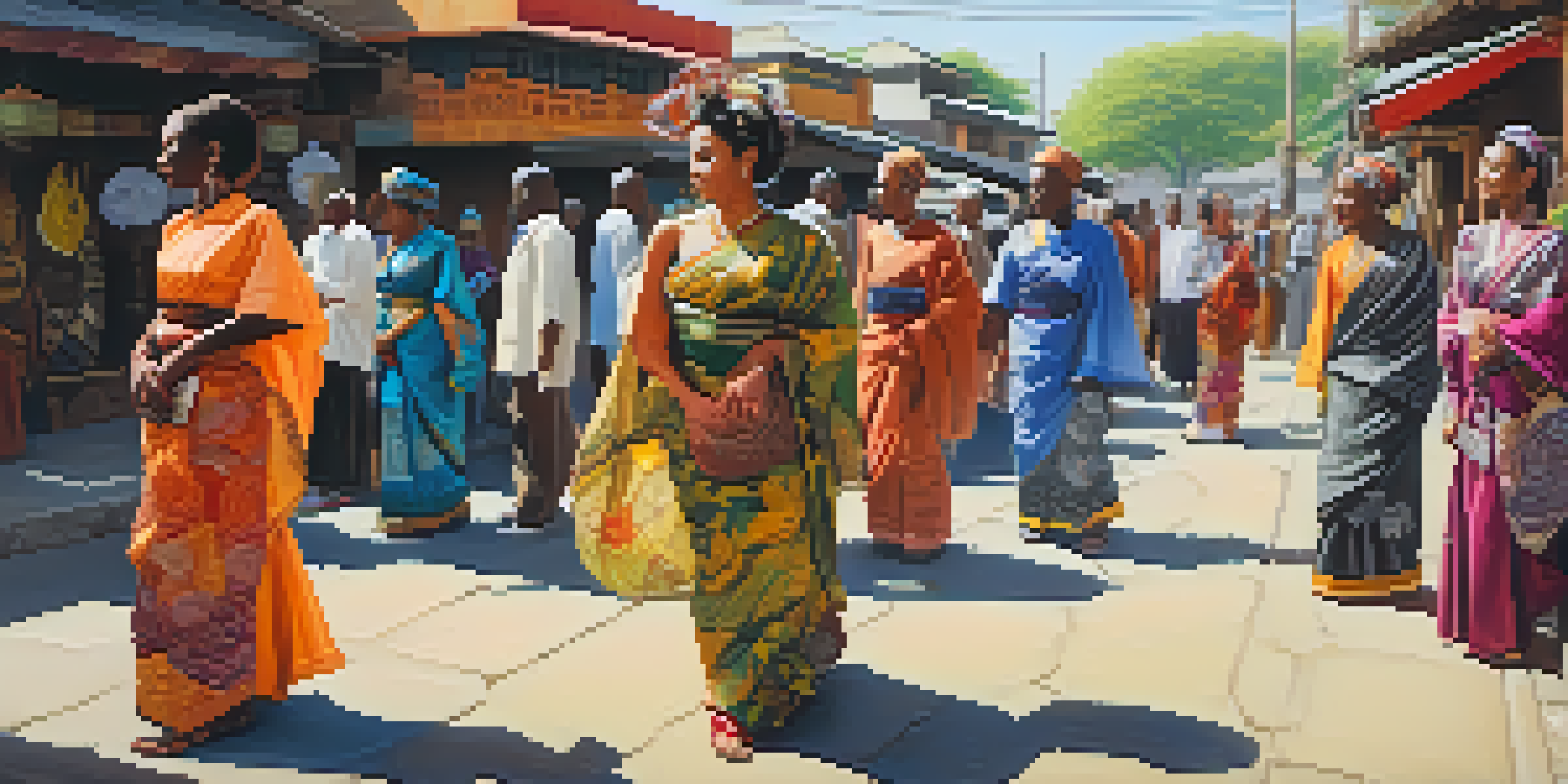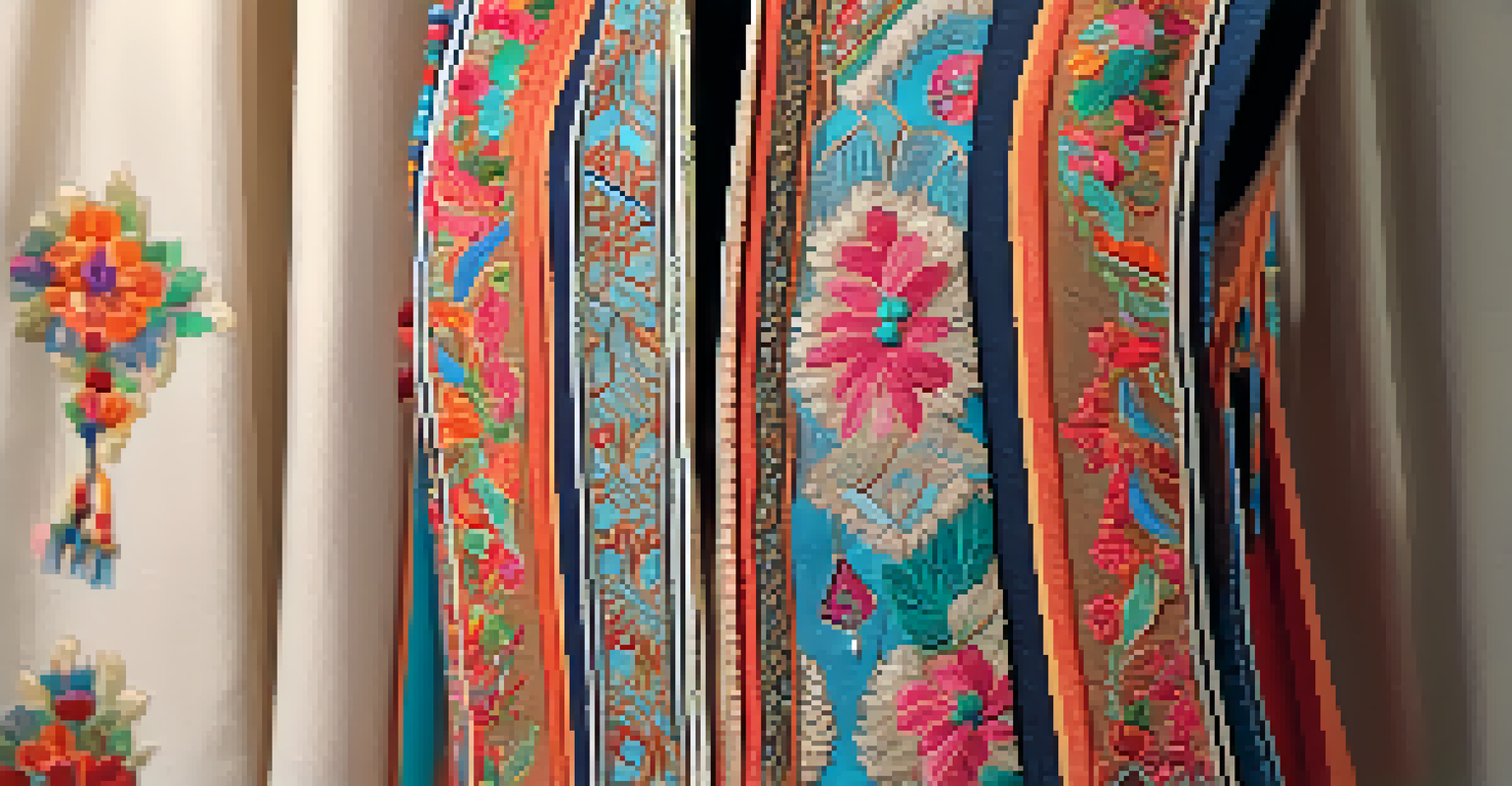The Impact of Cultural Fashion on Personal Branding

Understanding Cultural Fashion and Its Significance
Cultural fashion is more than just clothing; it's a reflection of identity, heritage, and values. It encapsulates the stories and traditions of different communities, allowing individuals to express their backgrounds through their style. In today’s globalized world, cultural fashion serves as a bridge, connecting people across diverse backgrounds and fostering respect for various cultures.
Fashion is the armor to survive the reality of everyday life.
By integrating elements of cultural fashion into personal style, individuals can communicate their uniqueness and authenticity. For instance, choosing to wear a traditional garment like a sari or a kimono not only showcases appreciation for cultural heritage but also sparks conversations about its significance. This can enhance one's personal brand by adding layers of depth and narrative.
However, it’s essential to approach cultural fashion with sensitivity and respect. Appropriation versus appreciation is a fine line, and being mindful of this distinction can help avoid misrepresentation. Ultimately, cultural fashion can be a powerful tool for personal branding when done thoughtfully.
How Cultural Fashion Shapes Personal Identity
Personal identity is intricately tied to how we present ourselves, and cultural fashion plays a pivotal role in that presentation. The clothes we wear can signal our beliefs, values, and even our aspirations. For example, someone who chooses to wear sustainable fashion made by indigenous artisans may be conveying a commitment to environmental and social causes.

Moreover, cultural fashion can empower individuals to embrace their heritage in a world that often promotes conformity. When someone proudly showcases their cultural attire, it can instill a sense of pride and belonging, serving as a reminder of their roots. This connection to one’s identity not only enhances personal confidence but also enriches personal branding.
Cultural Fashion Reflects Identity
Cultural fashion serves as a powerful means for individuals to express their heritage, values, and personal stories.
In essence, the choices we make in fashion can narrate our personal stories. By thoughtfully incorporating cultural elements into our wardrobe, we can create a distinctive identity that resonates with others and invites curiosity.
The Influence of Social Media on Cultural Fashion Trends
Social media has revolutionized how we perceive and interact with cultural fashion. Platforms like Instagram and TikTok allow individuals to showcase their unique styles, making cultural fashion trends more visible than ever. This visibility can inspire others to explore different cultural aesthetics, leading to a broader appreciation and understanding of diverse fashion traditions.
Clothes mean nothing until someone lives in them.
However, this influence can be a double-edged sword. While social media can promote cultural fashion, it can also lead to trends that lack authenticity. For example, a specific cultural garment may become a fleeting trend rather than a meaningful expression of identity, risking the essence of its cultural significance.
To navigate this landscape, individuals can use social media as a tool for education. By sharing the stories and meanings behind cultural fashion pieces, they can foster genuine connections and encourage others to appreciate these styles for their true value.
Cultural Fashion as a Tool for Networking and Connection
Wearing cultural fashion can serve as an icebreaker in social situations, instantly connecting people through shared interests or experiences. When someone dons an outfit that reflects a specific culture, it often encourages dialogue and curiosity from others. This can lead to meaningful interactions, networking opportunities, and even friendships based on mutual appreciation.
For example, a person wearing a beautiful African print dress may find themselves approached by someone familiar with the culture or who has visited the region. Such encounters can lead to enriching conversations that enhance personal branding through storytelling and shared experiences.
Social Media Shapes Fashion Trends
Platforms like Instagram and TikTok influence cultural fashion visibility, but can also lead to trends that lack authenticity.
Thus, cultural fashion can play a significant role in building a personal and professional network. By embracing and sharing one's cultural identity, individuals can create a unique presence that resonates with others, fostering connections based on authenticity.
Balancing Personal Style and Cultural Sensitivity
While integrating cultural fashion into personal branding can be enriching, it’s vital to balance personal style with cultural sensitivity. This means acknowledging the origins and meanings of the garments we choose to wear. It's important to research and understand the cultural context behind specific fashion items to avoid misrepresentation.
For instance, wearing a Native American headdress at a festival might be seen as disrespectful, as it holds deep spiritual significance. Instead, individuals can seek out fashion pieces that celebrate diversity while ensuring they honor the cultures they draw inspiration from. This approach enriches personal branding by demonstrating a commitment to respect and understanding.
Ultimately, the goal is to create a personal style that reflects both individuality and cultural appreciation. Striking this balance not only enhances personal branding but also fosters a culture of respect and inclusivity in fashion.
The Role of Cultural Fashion in Professional Settings
Cultural fashion can also play a significant role in professional environments. Many workplaces are becoming increasingly diverse and inclusive, encouraging employees to express their cultural identities through their attire. This not only enriches the workplace culture but can also enhance personal branding within a professional context.
For example, wearing a traditional outfit on cultural heritage days can showcase personal pride while also educating colleagues about different cultures. This can lead to deeper conversations and understanding among team members, fostering a sense of community and collaboration.
Balance Sensitivity and Personal Style
Integrating cultural fashion into personal branding requires a respectful understanding of the garments' origins and meanings.
However, it’s essential to consider the appropriateness of cultural fashion in various professional settings. Striking a balance between personal expression and workplace norms can help individuals navigate their professional branding effectively, ensuring they remain authentic while also being mindful of their environment.
Embracing the Future of Cultural Fashion and Personal Branding
As we move forward, the intersection of cultural fashion and personal branding will continue to evolve. With an increasing emphasis on authenticity and representation in fashion, individuals are encouraged to explore their cultural heritages while crafting their unique styles. This trend not only celebrates diversity but also empowers individuals to take ownership of their narratives.
Emerging designers and brands are increasingly focusing on sustainable practices and cultural storytelling, creating pieces that resonate with the values of modern consumers. This shift signifies a growing appreciation for the stories behind fashion, allowing personal branding to flourish in a way that is both meaningful and impactful.

In conclusion, embracing cultural fashion in personal branding is not just about aesthetics; it’s about creating a narrative that reflects who we are. As we continue to explore this fascinating intersection, we can look forward to a future where fashion becomes a powerful tool for connection, understanding, and celebrating diversity.